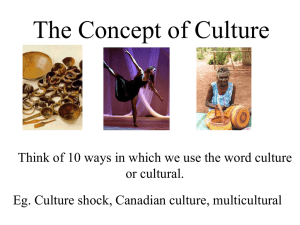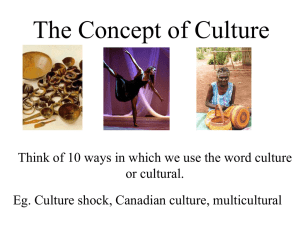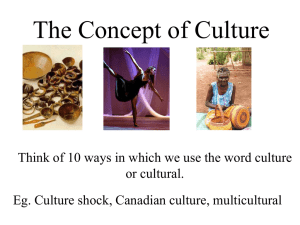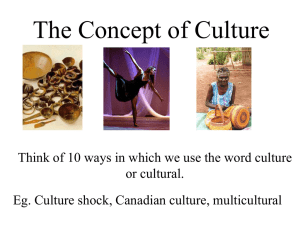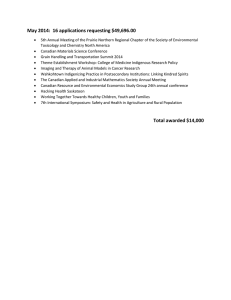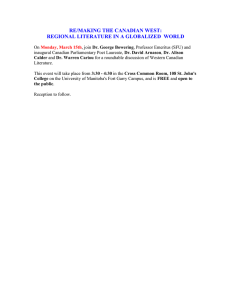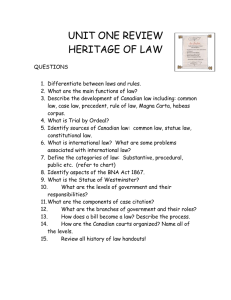The Concept of Culture
advertisement
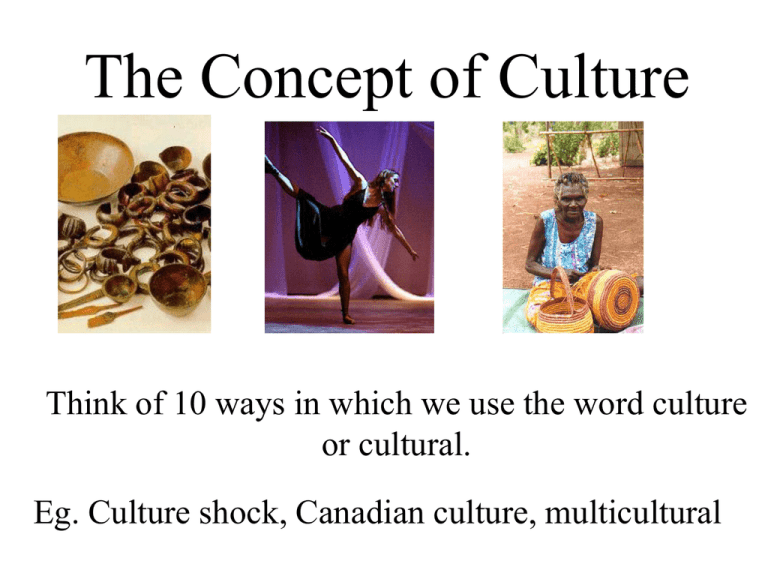
The Concept of Culture Think of 10 ways in which we use the word culture or cultural. Eg. Culture shock, Canadian culture, multicultural The Concept of Culture C. Construction C. Shock Agriculture Global C. C. Exchange Cross-C C. Diversity Multicultural To be C. High C. Enculturation C. Phenomenon Intercultural Counter C. C. Genocide C. Awareness Underground C. Pop C. C. Identity C. Perspective Elite C. C. Sustainability Canadian C. C. Imperialism C. Hegemony C. Evolution uncultured Consumer C Safety C Corporate C. Deviant C. Rural C. Youth C. gay/lesbian C C. Assimilation Dead C Café C. C. event C. survival drug C. Subculture World C. Bacterial C. Public C.. C. Relativism Non-anthropological/sociological Agriculture Bacterial C. Horticulture, Aquaculture Refinement of mind, tastes, and manners High C. Elite C To be C. uncultured A continuum Global C. World C. C. Evolution Public C. A Way of Life Rural C. Corporate C. Canadian C. Youth C. Café C. Island C. A set of shared attitudes, values, goals, and practices Counter C. Safety C. drug C. Subculture Consumer C C. Perspective gay/lesbian C A celebration of difference C. Diversity C. Awareness Multicultural C. Relativism Intercultural Cross-C C. Exchange A disparagement of difference C. Shock Deviant C. Pop C. Subculture C. Assimilation Underground C. An object (of manipulation) C. Sustainability C. Genocide Dead C C. survival C. Hegemony C. Imperialism C. event C. Heritage A sense of agency C. Construction Enculturation A sense of identity and otherness C. Identity Canadian C Edward Burnett Tylor 1832-1917 Culture or civilization, taken in its wide ethnographic sense, is that complex whole which includes knowledge, belief, art, morals, law, custom, and any other capabilities and habits acquired my man as a member of society. E. B. Tylor 1871 `The sum total of knowledge, attitudes and habitual behaviour patterns shared and transmitted by the members of a particular society' Ralph Linton (1940). The pattern of life within a community, the regularly recurring activities and material and social arrangements characteristic of a particular group'. Ward Goodenough (1957): “Culture is the framework of beliefs, expressive symbols, and values in terms of which individuals define their feelings and make their judgements” (Geertz 1957 American Anthropologist 59:32-54). Geertz 1973: `an historically transmitted pattern of meaning embodied in symbols, a system of inherited conceptions expressed in symbolic form by means which men communicate' (1973: 89). The socially transmitted knowledge and behaviour shared by a group of people – Peoples and Bailey 2006 Culture is a way of life Material Objects Ideas Attitudes Values Behavior Patterns “Everything that people have, think, and do as members of a society” (Ferraro, 2006) Culture is Relative What is Canadian Culture? I A M C A N A D I A N !!! I am not a lumberjack or a fur trader, And I don't live in an igloo or eat blubber or own a dogsled, And I don't know Jimmy, Sally, or Susie from Canada, Although I am certain they are really, really nice. I have a Prime Minister, not a President. I speak English and French, not American. And I pronounce it "about" ... not "a-boot". I can proudly sew my country's flag on my backpack. I believe in peacekeeping not policing; Diversity not assimilation; And that the beaver is a truly proud and noble animal! A tuque is hat; a chesterfield is a couch. And it is pronounced ZED not ZEE, ZED! Canada is the second largest landmass, The first nation of hockey, And the best part of North America! Culture reified Dimensions of Culture Values Norms Ideas/Beliefs Attitudes Symbols Traditions Artifacts Characteristics of Culture Culture is learned Culture is unconscious Culture is shared Culture is integrated Culture is Symbolic Culture is a way of life Culture is Dynamic Culture is Relative Culture is learned How do we learn our culture? Enculteration Culture is unconscious Culture is shared Culture is Relative Everyone should use a deodorant USA 89% French Canada 81% English Canada 77% United Kingdom 71% Italy 69% France 59% Australia 25% Such findings signal that Canadian values, ideas, and attitudes should not be relied upon when planning marketing forays into foreign consumer markets Culture is Integrated Economics Kinship law Religion Medicine Culture is Symbolic A wink or a twitch Culture is Dynamic 1896 1960 1918 1970 1924 1935 1986 1995 1955 2006 Why do humans have Culture? What is its function? To communicate - makes the actions of individuals intelligible to others A tool gives meaning to differences Identity Adaptive Can culture be maladaptive? Is Culture Public or Private? Ishi ?-1916 What is society? Society `A distinct and relatively autonomous community whose members' mutual social relations are embedded in and expressed through the medium of culture'. `Any portion of a community regarded as a unit distinguishable by particular aims or standards of living or conduct'. i.e. culture `A group of people who occupy a specific locality and who share the same cultural traditions or culture.'
